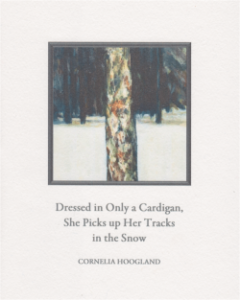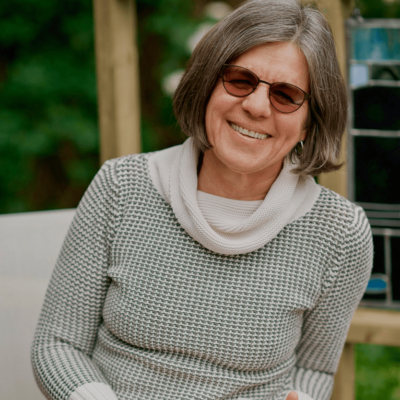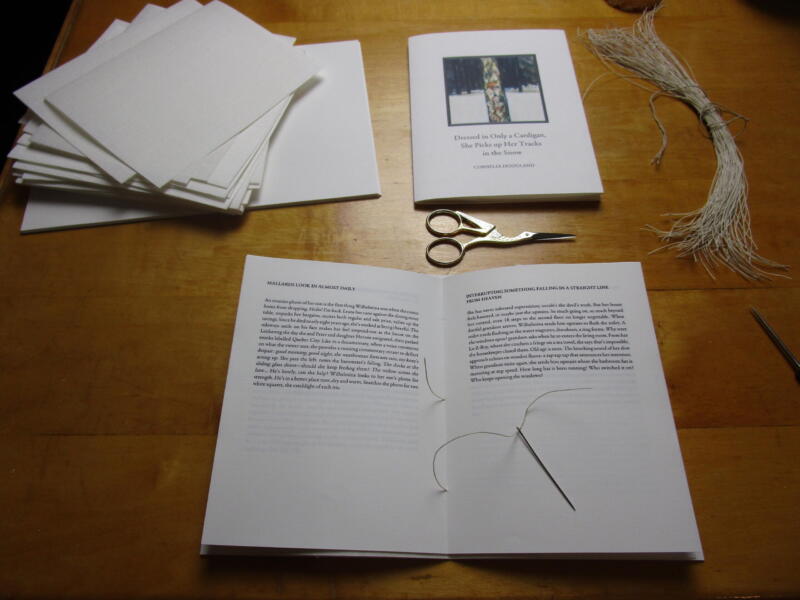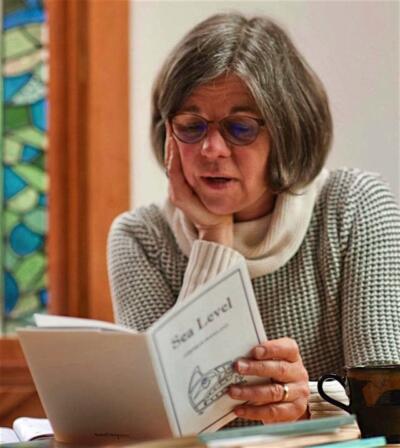1633 Snapshots from the shadows
Dressed in Only a Cardigan, She Picks up Her Tracks in the Snow
by Cornelia Hoogland
London, ON: baseline press, 2021
$13.50 / 9781928066606
Reviewed by Daniela Elza
*
 The very act of opening this carefully crafted artefact of a chapbook from baseline press is already an experience of immersion, a tease, a please, of the senses. Bound in St. Armand Canal paper, the cover art Nordic Column (1999) opens a window onto a view of trunks in a forest, the ground covered in snow. In the foreground — the midsection of a trunk, elaborately textured and coloured. In the distance — a forest of trunks, dark and growing darker. Between them — the distance of a snowfield. The image is by Roly Fenwick, an artist known for his lush oil paintings which explore the scenery not for the surface, but for what lingers under. These dozen prose poems read like such canvases.
The very act of opening this carefully crafted artefact of a chapbook from baseline press is already an experience of immersion, a tease, a please, of the senses. Bound in St. Armand Canal paper, the cover art Nordic Column (1999) opens a window onto a view of trunks in a forest, the ground covered in snow. In the foreground — the midsection of a trunk, elaborately textured and coloured. In the distance — a forest of trunks, dark and growing darker. Between them — the distance of a snowfield. The image is by Roly Fenwick, an artist known for his lush oil paintings which explore the scenery not for the surface, but for what lingers under. These dozen prose poems read like such canvases.
When you open the chapbook, the flyleaf of Ito-Iri Washi adds another layer of wave, and texture, through the snowy scape. We can almost see though. The body of the book is laid out on Royal Sundance Linen. The contents itself reads like a poem. Here are the first three titles:
The Milky Way Whooshes In, Takes a Number, Finds a Seat
The Days Are Pencilled In
Oh Lord, the Terror of Beginnings

From Wilhelmina’s youth to the “the catalogue of moves” a failing body makes less and less negotiable, there are many beginnings: emigrating from the Netherlands to Canada, the loss of a son, moving to a new house, navigating stairs and memory. This is a journey with no instructions. Even the small guideposts, like page numbers, are gone. How to orient oneself? The choice of the third person to speak of Wilhelmina, who is Hoogland’s own mother, seems to also be part of this search, orientation, and disorientation.
In the first poem a door closes after Wilhelmina bids the cricket in the garage goodnight. Everything is still, even “The usual, careful shapes are unusually silent.” In this stillness we too are stilled. Page after page we look through windows, glimpse canvas after word-canvas. Wilhelmina’s dad teaching her to swim by tying a rope around her middle. She “exits childhood tethered, with father, God — even strangers — her reliable ropes.” When Wilhelmina immigrates to Canada, she and her husband work on Mr. Barrow’s farm. Wilhelmina endures difficult conditions, including the crude out-building in which “sideways snow gusting in through cracks, covering the bed.” The row of poplars that used to mark the place where the muddy farm stood, now gone. But there are also little blessings: “With each letter, postmarked and addressed, the tiny shock that it found her;” “a goat named for the joy of hollering Tiki Tiki Tiki,” and a “68-years letter correspondence with a friend.”
Fragments of memory spin like snowflakes through the air. Once they land on the page they begin to knit a scarf for the long winter ahead. A scarf patterned with the threads of small gestures, glances, textures, echoes, the things we do to survive, and even thrive.

The lines of these poems are haunted by the eeriness of loss, old age, the courage to leap continents, the resilience to learn new things, and begin, and begin, again and again, like learning to swim tethered to a rope, and sometimes not tethered at all. Beginnings until the moment of leaving. “And now everything shrinks, every action, every thought, is spliced in half and half again.”

The small canvases of these poems come into focus against the darkening trunks in the distance. The snow field stretches between.
“Dying is easy, it’s leaving that is hard.”
This family gallery is haunted by distances. The spirit of Hoogland’s mother flits from frame to frame. The snapshots spill out of the borders into the shadows; shadows hold the briefly lit spot in place. I suspect the choice of telling the story in the third person is also about traversing. I kept trying to remember Wilhelmina is Hoogland’s mother. Perhaps Hoogland chose that point of view to re-create the distance between canvas and viewer? Or to avoid sentimentality? A distance perhaps meant to bring us closer to not only the surface, but what lingers under? This kind of intimacy too is a parting: a distance we might never quite cover, except for the attempt to cross over and over.
At the end wonder remains: memories swirl and tumble in their endless reiterations; the hand, and voice, pointing in the profound gesture of “Look.” In that brevity and space, fragment becomes whole, like the snowflake tumbling through the air before landing; a moment, ever so brief, where, “The sky is, in itself, complete.”
*

Daniela Elza lived on three continents before immigrating to Canada in 1999. Her latest poetry collections are the broken boat (2020) & slow erosions (a chapbook in collaboration with poet Arlene Ang, 2020). This year she was the second place winner in the 2022 Ken Belford Poetry Prize for Social Justice. Daniela’s essays have found a home in Riddle Fence, Grain Magazine, Motherwell, Queen’s Quarterly, About Place Journal, and subTerrain. She is a founding member of the Place Mattering Matters Collective, which explores the poetry and math of home, and advocates for affordable housing in her community. For more you can go to her website. Editor’s note: Daniela Elza’s book the broken boat is reviewed by Christopher Levenson and she contributed to In memoriam E.D. Blodgett, edited by James Felton.
*
The British Columbia Review
Publisher and Editor: Richard Mackie
Formerly The Ormsby Review, The British Columbia Review is an on-line book review and journal service for BC writers and readers. The Advisory Board consists of Jean Barman, Wade Davis, Robin Fisher, Barry Gough, Hugh Johnston, Kathy Mezei, Patricia Roy, Maria Tippett, and Graeme Wynn. Provincial Government Patron (since September 2018): Creative BC. Honorary Patron: Yosef Wosk. Scholarly Patron: SFU Graduate Liberal Studies.
“Only connect.” – E.M. Forster
2 comments on “1633 Snapshots from the shadows”